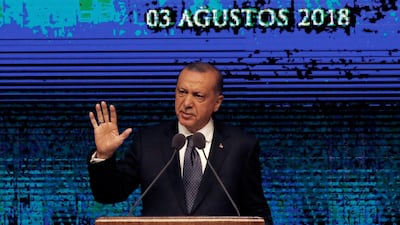Turkish President Recep Tayyip Erdogan has announced retaliatory sanctions against the US in response to escalating tensions over the case of an American pastor imprisoned in Turkey.
Speaking in Ankara on Saturday, Mr Erdogan said Turkey would freeze assets of senior US officials. "I have told my colleagues to start the process of freezing the assets of the American justice minister and interior ministers if they have them."
The president was speaking to the women's wing of his ruling Justice and Development Party. "The latest step taken by the US in the incident of Pastor Brunson in İzmir was not suitable to a strategic partner,” he said. “The US has displayed a serious disrespect with this step."
Earlier this week, the government of President Donald Trump imposed sanctions on two senior Turkish officials over the case of Andrew Brunson, who has been imprisoned on terrorism charges for the past two years.
Mr Trump has been demanding his release.
_____________
Read more:
Pompeo and Cavusoglu meet amid US-Turkey spat
US-Turkey row threatens historic alliance between Nato allies
New low in US-Turkey ties raises fears for Turkish economy
_____________
Despite the tensions, the two countries remain valued partners, US Secretary of State Mike Pompeo said on Saturday.
Speaking at the Asean Regional Forum Retreat in Singapore, Mr Pompeo said the Nato allies would continue working together.
"Turkey is a Nato partner with whom the United States has every intention of continuing to work cooperatively," Mr Pompeo said.
It is not clear whether US Secretary of the Interior Ryan Zinke or Attorney General Jeff Sessions have any assets in Turkey.
Mr Erdogan added that he hoped to avoid a zero sum relationship with the US. "We don't want to be a party to lose-lose games. Moving political and judicial disputes into an economic dimension will be harmful for both sides."

